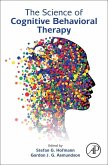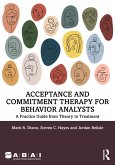Functional Analysis in Clinical Treatment
Herausgegeben:Sturmey, Peter
Functional Analysis in Clinical Treatment
Herausgegeben:Sturmey, Peter
- Broschiertes Buch
- Merkliste
- Auf die Merkliste
- Bewerten Bewerten
- Teilen
- Produkt teilen
- Produkterinnerung
- Produkterinnerung
Much of clinical psychology relies upon cognitive behavior therapy to treat clinical disorders via attempting to change thinking and feeling in order to change behavior. Functional approaches differ in that they focus on context and the environmental influence on behavior, thoughts, and feelings. This second edition of Functional Analysis in Clinical Treatment updates the material in keeping with DSM-5 and ICD-10 and provides 40% new information, including updated literature reviews, greater detail in the functional analysis/assessment sections of each chapter, two new chapters on autism…mehr
Andere Kunden interessierten sich auch für
![The ACT in Context The ACT in Context]() Steven C. HayesThe ACT in Context38,99 €
Steven C. HayesThe ACT in Context38,99 €![The Science of Cognitive Behavioral Therapy The Science of Cognitive Behavioral Therapy]() The Science of Cognitive Behavioral Therapy70,99 €
The Science of Cognitive Behavioral Therapy70,99 €![Remote Fieldwork Supervision for BCBA® Trainees Remote Fieldwork Supervision for BCBA® Trainees]() Lisa N. BrittonRemote Fieldwork Supervision for BCBA® Trainees56,99 €
Lisa N. BrittonRemote Fieldwork Supervision for BCBA® Trainees56,99 €![Acceptance and Commitment Therapy for Behavior Analysts Acceptance and Commitment Therapy for Behavior Analysts]() Mark R. DixonAcceptance and Commitment Therapy for Behavior Analysts51,99 €
Mark R. DixonAcceptance and Commitment Therapy for Behavior Analysts51,99 €![Skills-based Caring for a Loved One with an Eating Disorder Skills-based Caring for a Loved One with an Eating Disorder]() Janet TreasureSkills-based Caring for a Loved One with an Eating Disorder51,99 €
Janet TreasureSkills-based Caring for a Loved One with an Eating Disorder51,99 €![Cognitive Behaviour Therapy for Eating Disorders in Young People Cognitive Behaviour Therapy for Eating Disorders in Young People]() Riccardo Dalle Grave (Italy Villa Garda Hospital)Cognitive Behaviour Therapy for Eating Disorders in Young People166,99 €
Riccardo Dalle Grave (Italy Villa Garda Hospital)Cognitive Behaviour Therapy for Eating Disorders in Young People166,99 €![Intermittent Explosive Disorder Intermittent Explosive Disorder]() Intermittent Explosive Disorder112,99 €
Intermittent Explosive Disorder112,99 €-
-
-
Much of clinical psychology relies upon cognitive behavior therapy to treat clinical disorders via attempting to change thinking and feeling in order to change behavior. Functional approaches differ in that they focus on context and the environmental influence on behavior, thoughts, and feelings. This second edition of Functional Analysis in Clinical Treatment updates the material in keeping with DSM-5 and ICD-10 and provides 40% new information, including updated literature reviews, greater detail in the functional analysis/assessment sections of each chapter, two new chapters on autism spectrum disorders and chronic health problems, and examples of worked assessments, such as interview transcripts, ABC charts, and observational data.
Produktdetails
- Produktdetails
- Practical Resources for the Mental Health Professional
- Verlag: Academic Press / Elsevier Science & Technology
- Artikelnr. des Verlages: C2015-0-05507-1
- 2. Aufl.
- Seitenzahl: 586
- Erscheinungstermin: 21. März 2020
- Englisch
- Abmessung: 174mm x 230mm x 27mm
- Gewicht: 930g
- ISBN-13: 9780128054697
- ISBN-10: 0128054697
- Artikelnr.: 57471068
- Herstellerkennzeichnung
- Libri GmbH
- Europaallee 1
- 36244 Bad Hersfeld
- 06621 890
- Practical Resources for the Mental Health Professional
- Verlag: Academic Press / Elsevier Science & Technology
- Artikelnr. des Verlages: C2015-0-05507-1
- 2. Aufl.
- Seitenzahl: 586
- Erscheinungstermin: 21. März 2020
- Englisch
- Abmessung: 174mm x 230mm x 27mm
- Gewicht: 930g
- ISBN-13: 9780128054697
- ISBN-10: 0128054697
- Artikelnr.: 57471068
- Herstellerkennzeichnung
- Libri GmbH
- Europaallee 1
- 36244 Bad Hersfeld
- 06621 890
I have worked with children and adults with developmental disabilities for over 30 years as a volunteer; camp counselor; researcher; clinical psychologist in the British National Health Service; Chief Psychologist in developmental centers in Texas; consultant for many community services; and consultant to the states of Louisiana and Wyoming. I have been involved in professional training in Britain, Louisiana State University and now Queens College. It has always struck me that children and adults with developmental disabilities would have a better life, be happier, more autonomous and valued by other people if their staff and family members got a little help to do few simple things -interact positively and often, use contingent reinforcement accurately, teach a few simple skills and be more sensitive to preferences. I also believe that if these happened consistently, staff and family members would feel more competent.
1. Structural and functional approaches to psychopathology and case formulation
Peter Sturmey, John Ward-Horner and Erica Doran
2. Operant and respondent behavior
Peter Sturmey, John Ward-Horner and Erica Doran
3. Advanced concepts and methods of intervention in behavioral approaches to psychopathology
Peter Sturmey, Erica Doran and John Ward-Horner
4. Functional analysis methodology in developmental disabilities
Nienke Peters-Scheffer and Robert Didden
5. Attention deficit hyperactivity disorder
Nancy A. Neef, Christopher J. Perrin and John Northup
6. The adaptive nature of coercive interactions between parents and their children with defiant Attention Deficit Hyperactivity Disorder: implications for treatment
Jeffrey S. Danforth and James W. Diller
7. Function-based assessment and treatment of pediatric feeding disorders
Cathleen C. Piazza, Vivian F. Iban~ez, Caitlin A. Kirkwood, Jaime G. Crowley and Sarah D. Haney
8. Tic disorders and trichotillomania
Raymond G. Miltenberger, Jordan T. Stiede, Douglas W. Woods and Michael B. Himle
9. Encopresis and enuresis
Marianne L. Jackson, W. Larry Williams, Sharlet D. Rafacz and Patrick C. Friman
10. Stereotypic movement disorder
Craig H. Kennedy and Michael E. May
11. A contextual model of care for persons with dementia
Adrienne K. Chong, Ali Molaie and Jane E. Fisher
12. Brain injury
Mark R. Dixon, Jessica M. Hinman and Holly L. Bihler
13. A behavioral approach to the treatment of substance use disorders
Sarah H. Heil, Catalina N. Rey, Danielle R. Davis and Stephen T. Higgins
14. Schizophrenia and other psychotic disorders
David A. Wilder, Stephen E. Wong, Ansley C. Hodges and Hallie M. Ertel
15. Major depressive disorder
Alexandra L. Rose, Derek R. Hopko, Carl W. Lejuez and Jessica F. Magidson
16. The fear factor: A functional perspective on anxiety
Patrick C. Friman and Simon Dymond
17. Sexual disorders
Joseph J. Plaud
18. Eating disorders
Ata Ghaderi
19. Personality disorders
Rhonda Merwin, Purdence Cuper, Thomas Lynch and Kibby McMahon
20. Impulse-control disorders
Mark R. Dixon, Jessica M. Hinman and Taylor E. Johnson
21. A behavioral approach to the treatment of chronic illnesses
Bethany R. Raiff, Connor Burrows, Jessica Nastasi, Caitlyn Upton and Matthew Dwyer
22. Functional analysis in clinical treatment: 10 years of progress, current status, and future directions
Peter Sturmey
Peter Sturmey, John Ward-Horner and Erica Doran
2. Operant and respondent behavior
Peter Sturmey, John Ward-Horner and Erica Doran
3. Advanced concepts and methods of intervention in behavioral approaches to psychopathology
Peter Sturmey, Erica Doran and John Ward-Horner
4. Functional analysis methodology in developmental disabilities
Nienke Peters-Scheffer and Robert Didden
5. Attention deficit hyperactivity disorder
Nancy A. Neef, Christopher J. Perrin and John Northup
6. The adaptive nature of coercive interactions between parents and their children with defiant Attention Deficit Hyperactivity Disorder: implications for treatment
Jeffrey S. Danforth and James W. Diller
7. Function-based assessment and treatment of pediatric feeding disorders
Cathleen C. Piazza, Vivian F. Iban~ez, Caitlin A. Kirkwood, Jaime G. Crowley and Sarah D. Haney
8. Tic disorders and trichotillomania
Raymond G. Miltenberger, Jordan T. Stiede, Douglas W. Woods and Michael B. Himle
9. Encopresis and enuresis
Marianne L. Jackson, W. Larry Williams, Sharlet D. Rafacz and Patrick C. Friman
10. Stereotypic movement disorder
Craig H. Kennedy and Michael E. May
11. A contextual model of care for persons with dementia
Adrienne K. Chong, Ali Molaie and Jane E. Fisher
12. Brain injury
Mark R. Dixon, Jessica M. Hinman and Holly L. Bihler
13. A behavioral approach to the treatment of substance use disorders
Sarah H. Heil, Catalina N. Rey, Danielle R. Davis and Stephen T. Higgins
14. Schizophrenia and other psychotic disorders
David A. Wilder, Stephen E. Wong, Ansley C. Hodges and Hallie M. Ertel
15. Major depressive disorder
Alexandra L. Rose, Derek R. Hopko, Carl W. Lejuez and Jessica F. Magidson
16. The fear factor: A functional perspective on anxiety
Patrick C. Friman and Simon Dymond
17. Sexual disorders
Joseph J. Plaud
18. Eating disorders
Ata Ghaderi
19. Personality disorders
Rhonda Merwin, Purdence Cuper, Thomas Lynch and Kibby McMahon
20. Impulse-control disorders
Mark R. Dixon, Jessica M. Hinman and Taylor E. Johnson
21. A behavioral approach to the treatment of chronic illnesses
Bethany R. Raiff, Connor Burrows, Jessica Nastasi, Caitlyn Upton and Matthew Dwyer
22. Functional analysis in clinical treatment: 10 years of progress, current status, and future directions
Peter Sturmey
1. Structural and functional approaches to psychopathology and case formulation
Peter Sturmey, John Ward-Horner and Erica Doran
2. Operant and respondent behavior
Peter Sturmey, John Ward-Horner and Erica Doran
3. Advanced concepts and methods of intervention in behavioral approaches to psychopathology
Peter Sturmey, Erica Doran and John Ward-Horner
4. Functional analysis methodology in developmental disabilities
Nienke Peters-Scheffer and Robert Didden
5. Attention deficit hyperactivity disorder
Nancy A. Neef, Christopher J. Perrin and John Northup
6. The adaptive nature of coercive interactions between parents and their children with defiant Attention Deficit Hyperactivity Disorder: implications for treatment
Jeffrey S. Danforth and James W. Diller
7. Function-based assessment and treatment of pediatric feeding disorders
Cathleen C. Piazza, Vivian F. Iban~ez, Caitlin A. Kirkwood, Jaime G. Crowley and Sarah D. Haney
8. Tic disorders and trichotillomania
Raymond G. Miltenberger, Jordan T. Stiede, Douglas W. Woods and Michael B. Himle
9. Encopresis and enuresis
Marianne L. Jackson, W. Larry Williams, Sharlet D. Rafacz and Patrick C. Friman
10. Stereotypic movement disorder
Craig H. Kennedy and Michael E. May
11. A contextual model of care for persons with dementia
Adrienne K. Chong, Ali Molaie and Jane E. Fisher
12. Brain injury
Mark R. Dixon, Jessica M. Hinman and Holly L. Bihler
13. A behavioral approach to the treatment of substance use disorders
Sarah H. Heil, Catalina N. Rey, Danielle R. Davis and Stephen T. Higgins
14. Schizophrenia and other psychotic disorders
David A. Wilder, Stephen E. Wong, Ansley C. Hodges and Hallie M. Ertel
15. Major depressive disorder
Alexandra L. Rose, Derek R. Hopko, Carl W. Lejuez and Jessica F. Magidson
16. The fear factor: A functional perspective on anxiety
Patrick C. Friman and Simon Dymond
17. Sexual disorders
Joseph J. Plaud
18. Eating disorders
Ata Ghaderi
19. Personality disorders
Rhonda Merwin, Purdence Cuper, Thomas Lynch and Kibby McMahon
20. Impulse-control disorders
Mark R. Dixon, Jessica M. Hinman and Taylor E. Johnson
21. A behavioral approach to the treatment of chronic illnesses
Bethany R. Raiff, Connor Burrows, Jessica Nastasi, Caitlyn Upton and Matthew Dwyer
22. Functional analysis in clinical treatment: 10 years of progress, current status, and future directions
Peter Sturmey
Peter Sturmey, John Ward-Horner and Erica Doran
2. Operant and respondent behavior
Peter Sturmey, John Ward-Horner and Erica Doran
3. Advanced concepts and methods of intervention in behavioral approaches to psychopathology
Peter Sturmey, Erica Doran and John Ward-Horner
4. Functional analysis methodology in developmental disabilities
Nienke Peters-Scheffer and Robert Didden
5. Attention deficit hyperactivity disorder
Nancy A. Neef, Christopher J. Perrin and John Northup
6. The adaptive nature of coercive interactions between parents and their children with defiant Attention Deficit Hyperactivity Disorder: implications for treatment
Jeffrey S. Danforth and James W. Diller
7. Function-based assessment and treatment of pediatric feeding disorders
Cathleen C. Piazza, Vivian F. Iban~ez, Caitlin A. Kirkwood, Jaime G. Crowley and Sarah D. Haney
8. Tic disorders and trichotillomania
Raymond G. Miltenberger, Jordan T. Stiede, Douglas W. Woods and Michael B. Himle
9. Encopresis and enuresis
Marianne L. Jackson, W. Larry Williams, Sharlet D. Rafacz and Patrick C. Friman
10. Stereotypic movement disorder
Craig H. Kennedy and Michael E. May
11. A contextual model of care for persons with dementia
Adrienne K. Chong, Ali Molaie and Jane E. Fisher
12. Brain injury
Mark R. Dixon, Jessica M. Hinman and Holly L. Bihler
13. A behavioral approach to the treatment of substance use disorders
Sarah H. Heil, Catalina N. Rey, Danielle R. Davis and Stephen T. Higgins
14. Schizophrenia and other psychotic disorders
David A. Wilder, Stephen E. Wong, Ansley C. Hodges and Hallie M. Ertel
15. Major depressive disorder
Alexandra L. Rose, Derek R. Hopko, Carl W. Lejuez and Jessica F. Magidson
16. The fear factor: A functional perspective on anxiety
Patrick C. Friman and Simon Dymond
17. Sexual disorders
Joseph J. Plaud
18. Eating disorders
Ata Ghaderi
19. Personality disorders
Rhonda Merwin, Purdence Cuper, Thomas Lynch and Kibby McMahon
20. Impulse-control disorders
Mark R. Dixon, Jessica M. Hinman and Taylor E. Johnson
21. A behavioral approach to the treatment of chronic illnesses
Bethany R. Raiff, Connor Burrows, Jessica Nastasi, Caitlyn Upton and Matthew Dwyer
22. Functional analysis in clinical treatment: 10 years of progress, current status, and future directions
Peter Sturmey








